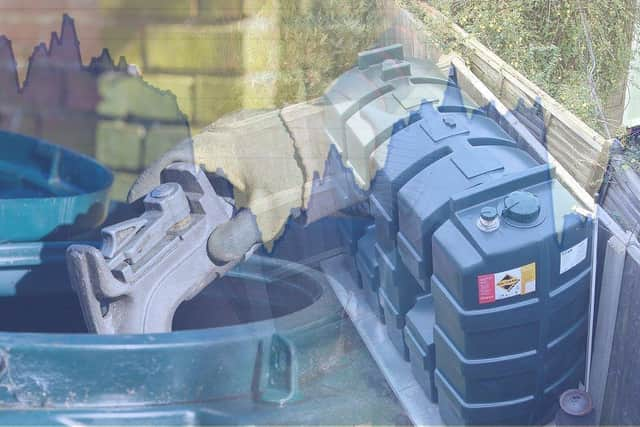Cost of living: The percentage of Aylesbury Vale residents dependent on rocketing oil heating revealed
and live on Freeview channel 276
In Aylesbury Vale 8% of households use oil to power their boilers instead of relying on the gas grid.
Out of 399 council areas in Wales and England data from the Office for National Statistics (ONS) ranks Aylesbury Vale at 77th when it comes to dependence on this heating method.
Advertisement
Advertisement
Prices have risen by 50% in a year and as oil is not covered by the energy price cap, households have no way of knowing how much higher the cost could go.


Some families say they have been left unable to cope with the rising costs and are having to turn off their heating to be able to afford food.
People with oil boilers have to buy the fuel in bulk from suppliers and store it at their properties in tanks.
The price of the fuel is closely linked to the cost of crude oil which has increased dramatically after Russia’s invasion of Ukraine.
Advertisement
Advertisement
In England, about 3% of households use the fuel, although this rises to 7% in the South West and East of England.


In addition, households on low incomes are often unable to pay the upfront capital costs for gas boilers or other more efficient heating sources such as heat pumps.
The fast-moving price of heating oil means many suppliers now don’t allow households to order and pay for deliveries a week in advance, instead telling them the price the day before.
According to the UK and Ireland Fuel Distributors Association (UKIFDA), oil companies buy oil from refineries or terminals, which is then stored in their local depots. As they can only hold two to three days worth of supply, companies have to make very regular purchases to refill their stock, paying prices that are set on the day.
Advertisement
Advertisement
They said it has been very difficult for them to tell the consumers how much it will cost because prices are changing rapidly and their supply only lasts two to three days.
“In the first ten days of the invasion of Ukraine, prices went up between five and 10p a day, ” Ken Cronin, its chief executive, said.
“They peaked at around £1.40 to £1.50 and where they are now is around 95p to £1.10. When you’ve got prices moving so quickly, it is almost impossible to give customers prices.
“Another challenge for us was that our oil suppliers were moving away from Russia stock which caused shortages and disruption in the market.”
Advertisement
Advertisement
Currently, heating oil prices are lower than a month ago. According to BoilerJuice, a price comparison site for home heating oil, the average price was 97p per litre on April 5, which has decreased from £1.60 on March 10.
Tim Buckman, chief marketing officer at BoilerJuice, said: “Prices do seem to have stabilised and I think heating oil prices have the opportunity to come down a little bit further now that demand is going down, but it’s obviously dependent on what happens with crude oil prices and it’s very volatile.”
The average price of home heating oil per 1,000 litres has increased by 49% in the past year, from £466 in February 2021 to £696 in February 2022, according to the Office for National Statistics.
But Mr Buckman says it’s important to look at the long-term trend.
Advertisement
Advertisement
“What people need to remember is how much they were paying two years ago during the first lockdown where it was 20p a litre and a lot of people enjoyed the savings they made at that time,” he said.
“Now crude oil prices have gone up significantly and we are paying more but the truth is you average it out over a long period of time and it’s quite flat.”
He said his advice for customers is to compare prices and put a contingency plan in place.
He said: “I would advise people to shop around and check the price with a number of local suppliers. If people want the surety of not running out, definitely don’t leave it to the last minute.
Advertisement
Advertisement
“I would also set up a payment plan and start saving up now so put some small amount of money aside and when the winter comes, you have a bit of a buffer there ready to start placing orders.”
Energy cap
Unlike gas and electricity, the price of home heating oil isn’t covered by a price cap. Under the Domestic Gas and Electricity (Tariff Cap) Act which came into force in 2018, Ofgem is required to set the maximum price suppliers can charge customers on a standard or default tariff but not those using non-mains gas heating such as LPG or heating oil.
This is said to be due to the fact that these markets have a different dynamic to mainstream utilities. For example, customers can choose from a number of oil suppliers and are not confined by contracts.
People can also join oil buying clubs to unlock bulk-buying discounts.
Advertisement
Advertisement
However, there have been calls for the price cap on energy to be extended to the domestic heating oil market, including a petition to Parliament signed by more than 7,000 people.
A spokesperson for the Department for Business, Energy and Industrial Strategy said: “If consumers are off the gas grid, but on a default tariff for their electricity supply, they will still be protected by the Energy Price Cap.
“In the longer term, improving the energy efficiency of our homes and buildings is vital to keeping household energy costs down and reducing carbon emissions, which is why we are investing £6 billion into making homes more energy efficient over the next ten years.”